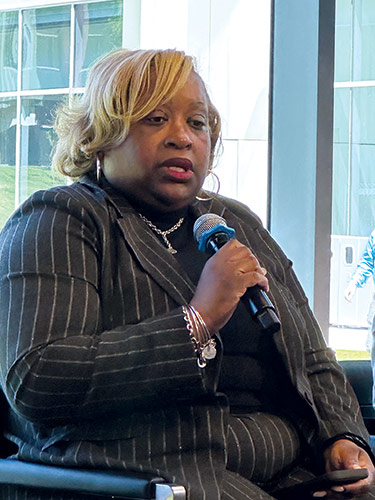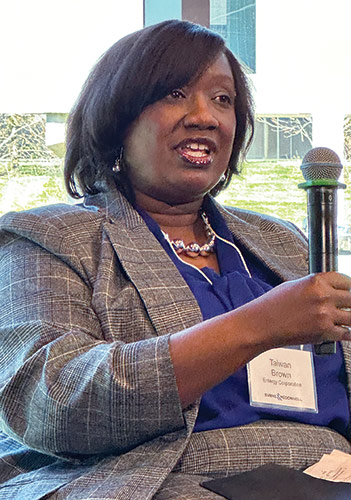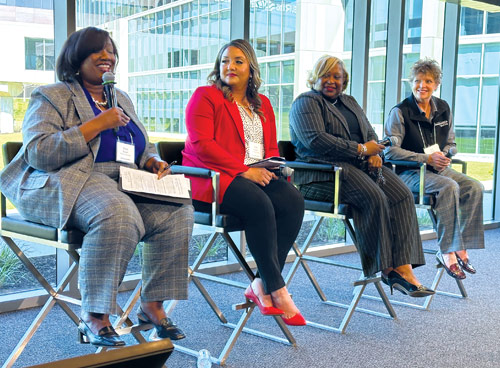Unique conversations
Tremese Davis is VP of Operations at Nicor Gas. Taiwan Brown is VP of Diversity and Workforce Strategies at Entergy.


The "Equity in Energy" event adopted its keynote address' title "Beyond Ordinary" as its theme. A panel discussion among four diverse subcontractor leaders was inspiring as well. The CEO of Trice Construction, the Presidents of APC Construction and EVS, and the Business Development Director of Blaze Contracting all brought unique perspectives on how they and similar companies nationwide can take on increasing roles in the energy transformation.
PUF's Steve Mitnick: Talk about your backgrounds that brought you to your current positions.
Taiwan Brown: I have an electrical engineering degree. I grew up in the south, in Greensboro, North Carolina. The majority of my experiences growing up were predominantly Black.
Take my schooling. I went to a predominantly Black high school. I went to a historically Black university, North Carolina Agricultural and Technical State University.
My first job out of college was at Texas Instruments. TI at that time, was about thirty thousand people. It was a global company. There were people from all over.
Even the food. I had never tasted Indian food. There were many new experiences that I had. I had to learn. Some of it was through exposure.
There were things that people did growing up that I had never experienced. I was in a technical sales rotation program. It was male dominated. The guys liked playing golf. I was trying to fit in. I was early in my career.
Some of my colleagues and I decided we're going to learn how to play golf. We took golf lessons. After the third one, I'm like, okay, I know they say deals happen on the golf course, but I can't even see the ball.
Why am I even trying to do it? I stopped taking the lessons. I realized I'm going to have to find another way and something that works for me, to close the deal. Rather than trying to assimilate, finding a way to be me and make it work.
Tremese Davis: I also had a Black experience growing up. Grew up in a middle class, predominantly Black neighborhood. Went to school with mostly Black kids. I encountered other races on a daily basis when I went to college.
Not only, how do I fit in? It was understanding what was acceptable for some wasn't always acceptable for me.
Even in the workplace now, after twenty-five years in this industry, how I show up. I'm always conscious of it.
Because if I am emotional, then I'm too emotional. If my male counterpart is emotional, he's passionate. It's understanding what's acceptable for me.
Taiwan Brown: That's a good point. We're both at the executive levels of our organization. It's not like you get to this place where you have per se arrived. Where you're not thinking about how I show up. What my appearance looks like. Making sure I'm ready to knock the presentation out of the park. That doesn't go away.
We've both been in the workforce twenty-plus years. We've climbed the corporate ladder and achieved levels of success. But that doesn't go away.
Tremese Davis: It doesn't go away. If I have a misstep, then the perception is all Black women have that same misstep. White males don't deal with that.
If Paul makes a mistake, that's Paul's mistake. No one says, I'm not going to work with any other White person because I had this experience with Paul. If it's Tremese or Taiwan who made a mistake, or who said something I didn't like, now that becomes your experience with every Black woman you encounter.
PUF: How does this translate to your job?
Taiwan Brown: At the foundational level, it is making sure people understand what we're even talking about when we talk about these concepts. Diversity is difference. There are a variety of differences. Even though Tremese and I have some similar experiences, we're still different.
It's not just identity differences, what you can see. It's also our personalities, backgrounds, and experiences. It's what shapes us. Even how we approach problem solving. Our personalities, all those are different.
It's about how to have an appreciation of those differences, encourage you to be uniquely you, who you are, and bring your best authentic self into the workplace. One of the things you can probably tell about me is I'm expressive. I talk with my hands.
If people tell me to tone down, well, you may not get the best me if I have to be too contained. But if my personality can shine through, and I feel like I can contribute in the way that suits me, you're going to get the best out of me. Because I'm going to be engaged. I'm going to want to contribute.
We also talk about inclusion. How do you leverage the differences that each of us bring? Ultimately, it's that sense of belonging.
At Entergy, we talk about belonging as a feeling. A feeling that you're a part of the team. That you have a seat at the table. That you can express yourself.
Sometimes I ask about a time when you didn't feel you belong? Guess what? We all know what that feels like.
If we have coworkers, employees at our organizations, who don't feel like they belong when they come to work, or when they are part of a team, are they going to do their best work? Are you going to get innovative problem solving and creative ideas?
PUF: It is about respect for being able to show your true self.
Tremese Davis: It's what Taiwan just talked about. Having an environment where you can have conversations, and even if you don't agree, can you respectfully disagree?
I always aim to understand. I may not like what you said. Or what you did. But I aim to understand your perspective.
Taiwan Brown: Absolutely. Mutual respect.
Tremese Davis: Right. We're made to be different. That's the spirit of DEI. Making sure that every person feels included, regardless of who you are, where you're from, what your preferences are.
The word belonging has an I-N-G on the end. Which means it's always happening.
PUF: Where will DEI be in three years?
Taiwan Brown: We're still going to be on the journey. Because this work is a journey. Nobody has cracked the code. We've seen some progress. We've seen some improvement.
We've been trying over the past several years to unite and bring people together. Whereas, in society as a whole right now, there's so much division.
However, for the people and companies for whom DEI is a value, and it is at their core, you're going to continue to see them make progress and strides. I don't think it's going to be quick. Because this work takes time.
Especially when you try to do it right. When you're not just checking a box.
Because part of it is about relationships and gaining understanding. That means bringing people together, truly building relationships, and fostering meaningful connections and dialogue.
Sometimes these things are tough to talk about. For all of us. For the companies where it's a value, you're going to see some strides and success.
At Entergy, I think about areas where we've had success. Where you see diverse teams coming together and you see their accomplishments. The business case is proven. We're getting results.
It's the cognitive abilities to think in different perspectives. When you're bringing in somebody early career, and you're putting them with somebody who's more seasoned, you're seeing them bounce ideas off each other. That's where true magic really happens.
PUF: Are you optimistic?
Tremese Davis: I am optimistic. However, I'm realistic as well. I believe that in the world we live in today, we are more open to talking about our differences. Whether they are physical differences, religious differences, political differences.
When I started my career, you didn't have those kinds of conversations in the workplace. So, I am optimistic that we have come as far as we've come. But we still have a lot further to go. Some of the things happening politically are moving us backward rather than forward. Leaders will have to hold to the things we all say we value to keep driving DEI.
'Equity in Energy' articles at fortnightly.com:
- Tremese Davis, Nicor Gas VP of Operations and Taiwan Brown, Entergy VP of Diversity and Workforce Strategies
- Cornell Johnson, Center for Energy Workforce Development Director of DEI
- Keith Porta, APC Construction President
- Gayl Turk, Blaze Contracting Director of Business Development
- Stephanie Hickman, Trice Construction CEO
- Andy Kim, EVS Engineering President
Lead image: From left, Entergy’s Taiwan Brown, Salt River Project’s Erika Castro, Nicor Gas’ Tremese Davis, and Consumers Energy’s Lynn Wilson.
Category (Actual):
Department:
